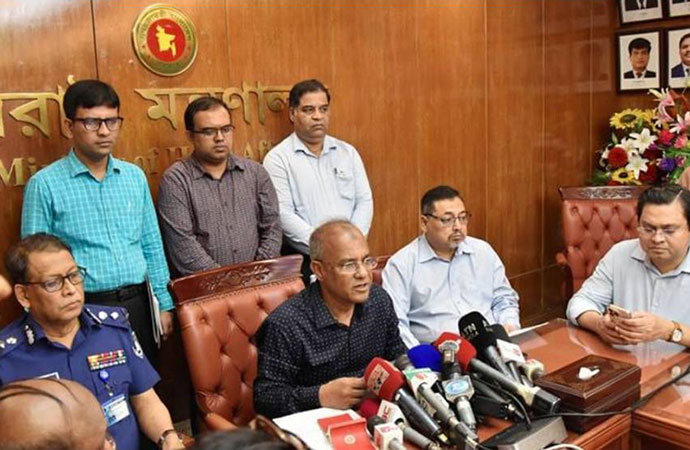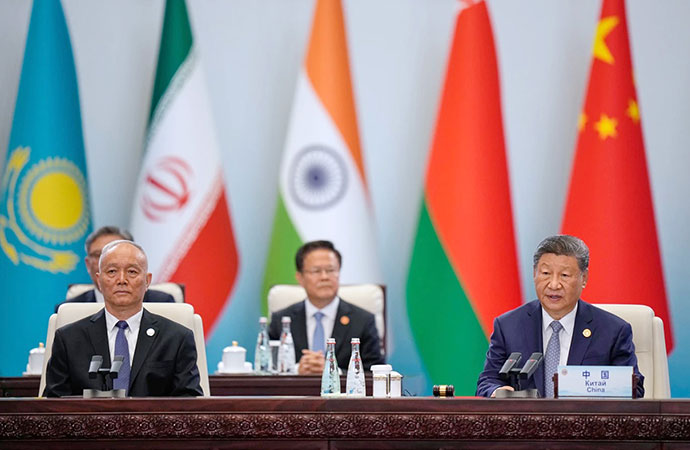Reportage

Photo: Collected
The retired Lieutenant General Jahangir Alam Chowdhury, serving as home affairs adviser to the interim government, divulged some very interesting information to start off the week. Since the interim government assumed office after the ouster of Awami League last year, some 123 organisations have staged 1,604 road blockades, usually associated with an intent to disrupt, or protest - on the roads of Dhaka and surrounding areas.
That works out to an average of four protests each day for over a year. And representative as it is, of the rollicking 13 months that we've witnessed in the life of the nation, it has also meant the current administration is the most embattled we have ever seen, constantly firefighting, and eating into the triple mandate it received - Justice, Reform and Election - from the leaders of last year's July Uprising. A mandate it now seems scarcely capable of honouring. The stunning collapse of the Awami League regime unleashed a wave of lawlessness exacerbated by factors such as the police leaving their posts.
What we didn't expect was that even after a year, or 13 months, the situation would feel as fragile or as chaotic as it did in those first few months. This abject failure to restore law and order must fall at the feet of the otherwise affable home affairs adviser. But to be fair, we would do well to take note of all the mitigating factors, such as the information he divulged regarding blockades.
It was the start of the week, but it wasn't at all as if the weekend had allowed for even a moment's respite. Friday and Saturday were both marked by separate incidents that would create openings for further instability. It meant we'd be starting yet another week, like almost any over the last year, standing on a virtual powder keg.
It all started on Friday (Aug. 30). Activists of the Jatiya Party and Gono Odhikar Parishad, neither of which can claim to command much support among the public, engaged in clashes starting from the evening. Their offices in Kakrail (JP) and Purana Paltan (GOP) , and the tensions seem to have stemmed from the GOP, looking to exploit the greater legitimacy they enjoy in post-Uprising Bangladesh, taking it upon themselves to get JP, which for years had remained the deposed Awami League's principal ally in the 14-party 'Mohajote', banned.
Although yet to face any formal bar on their activities as a party, suffice it to say the year has been a difficult one for JP. The party is completely out of touch with the younger generations, among whom they stand for little more than being enablers of 'Awami fascism'. Based on their ties to AL, they have been more or less shut out of the political process post-August 5. Notably they were not invited to any of the meetings over the July Charter, or to the event commemorating the first anniversary of the Uprising, where the July Declaration was read out, or any other significant event.
The spark for the latest incident was lit around 6:30pm on Friday, during a demonstration organised by Gono Odhikar to demand a "ban on the JP's political activities". So the specific programme on that day was related to demanding a ban on JP's activities as a political party. The interim government led by Muhammad Yunus in May this year banned all activities of the Awami League, and the logic goes that if AL is banned, their allies too must be subjected to the same.
GOP, led by Nurul Huq Nur, brought out a march to press home their demand to ban JP, that at one point along its route had to pass in front of the latter's central office. The situation turned into a bout of stone-throwing between the two groups, which continued for several minutes before police and Army personnel brought it under control.
Gono Odhikar Parishad claims their procession was attacked at the back by Jatiya Party activists who came down from their office building. Conversely, JP alleges that their headquarters came under attack by GOP.
Abu Hanif, a senior leader of Gono Odhikar Parishad's higher council, said in a statement that their rally was part of a scheduled evening protest. He claimed that at around 6:30pm near Paltan intersection, the rear section of their procession came under attack.
Hanif said something like "200 to 300 people" took part in the assault on GOP near the JP office, and he even alleged that Awami League and Jubo League members were also involved, blending in among the JP activists. GOP activists and supporters, he said in his statement, only "attempted to resist the attack".
Nurul Huq Nur, president of Gono Odhikar Parishad, and Rashed Khan, his number two as general secretary, were both present at the march. Rashed was injured in the early clashes, according to a post on his verified Facebook page. Nur however had a much worse fate awaiting him, that by the end of the night would leave almost the entire nation stunned, and many of the youth who are newly engaging in politics with enthusiasm and energy, visibly shaken.
Swearing by July
Nurul Huq Nur's influence on the current scenario prevailing in our body politic cannot be underestimated. He successfully led the original movement against quotas, garnering a concession from Hasina that wasn't ideal - but a concession nevertheless. By the time that culminated in 2018, many of the figures you now see in NCP, were just commencing their political pathways, or had just become politically conscious. Akhtar Hossain, Asif Mahmud, even Nahid Islam, were all his juniors in the original movement, or they were otherwise inspired by him.
Meanwhile things remained fluid on the ground. In response to the alleged "attack" on them, Gono Odhikar Parishad announced an immediate torchlight procession in protest. On the other hand, Khandaker Delowar Jalali, press secretary to the Jatiya Party chairman, described the incident as a "terror attack" on the party's central office. He announced a press conference to be held at 8:30pm that day at the party headquarters to address the matter. Little did she know then, that this press conference would never take place.
Because by the time it was 8.30pm, members of Ramna Police Station were also deployed to the scene as additional security, as the tensions had refused to die down - if anything they had gotten worse since the GOP brought out their torch procession, which was in protest of what they complained to be police partisanship earlier in the evening.
After another unruly hour or so of chase and counter-chase between activists of the two parties, it seemed they were both ready to wrap up. Both parties' leaders decided to hold press conferences at 9.30pm to put forward any other points they or their party members may have.
At 9:30pm, JP Secretary General Shamim Haider Patwary was able to hold a press conference where he said that the Gono Odhikar Parishad had held two meetings demanding the banning of JP and the arrest of G.M. Quader. He said he does not believe there is any justification for a political party to hold such a meeting. Patwary added that while leaving the meeting, GOP activists threw bricks at JP members, injuring several of them. Later when JP activists retaliated, prolonged chase and counter-chase ensued between the two sides.
Shamim Haider demanded a proper investigation into the incident and exemplary punishment for those responsible.
Over on the other side of the road, in front of the GOP's office, possibly the most viral video clip on social media this week shows Nur standing behind a makeshift podium, obviously getting ready to address an audience. Rashed is there right beside him, and he is flanked on both sides by his supporters and activists. The joint forces at this point have already decided to clear the place by laathi-charging them, but Nur doesn't know it yet. His expression changes from one of bewilderment to utter shock, and then later on, even resignation as a soldier brutally knocks him down after seeming to even mock him. This video ends here.
A separate video picks up the action some minutes later, and we see Nur slumped across the steps outside the building. A soldier has just finished with him. As soon as his face comes into view we see there is profuse bleeding. He looks barely conscious. That clip ends here. We next see a clip of him being carried first in the arms of his supporters, then onto a rickshaw, and that is how he was taken at first to the Islami Bank Central Hospital in Kakrail. Before the night was out, he would have to be transferred to DMCH.
The ferocity of the attack on Nur became clearer as the hours passed, and different specialists assigned to him gave their opinions. Early next morning (Saturday, Aug. 30) Dhaka Medical College Hospital Director Brigadier General Md Asaduzzaman officially confirmed that Nur had sustained a head injury, and a fractured nose. The former had led to some haemorrhaging on the first night, till he gained consciousness the next morning.
The attack, even if considered as part of a law enforcement move to clear the area, was excessively brutal - almost everyone agrees on that. What could have made the ruthlessness of the attack - 50 others were also injured in that last swoop - so imperative? This shocking instance of police brutality (although it is widely held that it was an army soldier who inflicted Nur's injuries) a stark reminder of how when it comes down to it, nothing has actually changed in Bangladesh. And the Monsoon Revolution still has a long way to go.
From bad to worse
An ISPR statement on the night of the attack was notable for its complete lack of remorse or even acknowledgement, of the injuries Nur suffered. It also sought to find refuge behind an excuse of fighting a mob that was threatening a political party's office.
In the event, although there is no credible report of GOP seeking to attack the JP office on Friday, the party was unable to discipline its workers, who went and set the JP office on fire the next day, amid further calls to ban the party. This time, law enforcement stood aside.
During his presser on Sunday, Jahangir Alam also lamented the "damned if you do, damned if you don't" situation in which the police find themselves, which is yet another impediment to the aim of maintaining order on the streets in particular.
"If the police act humanely, people act violently, they commit arson," the adviser said, making his frustration plain to see. He would then add, "If they (the police) are harsh, they get criticised."
The entire week passed before the government formed a three-member investigation commission to probe the attack that left Nur seriously injured.
The Cabinet Division issued a notification to this end on Thursday night (Sep. 4) . The commission will be headed by Justice Md Ali Reza of the Supreme Court's High Court Division. The other members include the Senior Secretary of the Ministry of Home Affairs and the Principal Staff Officer of the Armed Forces Division.
Meanwhile on Tuesday (Sep. 2), a garment worker was killed, and at least seven others were injured in a clash with law enforcers at the Uttara Export Processing Zone (EPZ) in Nilphamari. The deceased was identified as Md Habib, 21, an employee of Equ International -- a knitting factory.
Politicians getting beaten up, workers getting killed, both at the hands of law enforcement - it was almost deja vu, for those who saw these things up close during the Hasina era.
A study in double standards
While all this was happening, an even more sinister episode was playing out way down south in Chattogram, on Chittagong University's famed campus. Here the problem again would be inaction on the part of law enforcement - so you have two examples of excessive force, and two incidents of complete indifference from the joint forces.
Spread over an area of 2,312.32 acres (935.76 ha), CU is proud to have the largest campus in the country. university in Bangladesh. It encompasses the surrounding villages, and is nestled amidst hills and bisected by a stream. But this scenic setting became a hell on earth this week. The unrest began around 12:30am Saturday night and continued intermittently until 3pm Sunday, as students clashed with residents of nearby Jobra village. At least 220 people were injured, about 200 of them students. The law enforcement was nowhere to be seen in this case.
The Home Affairs adviser was talking to reporters after the meeting of the Core Committee on Law and Order, in the meeting room of the Home Ministry at the Secretariat on Sunday (Aug. 31).
In response to a question about how he sees the political unrest of the past few days and whether this is happening to thwart the election, Jahangir Alam Chowdhury said, "A political party whose activities have been banned wants to thwart the upcoming election. Due to this, the law and order situation has suddenly deteriorated. But the government is making every effort for a fair election."
When asked about the preparations for the election, the adviser said, "We are preparing for the election. Training is starting on September 7. However, the rest will depend on the political parties participating in the election."
If the chaos continues, that training may never be put to practical use.

























Leave a Comment
Recent Posts
Religion and Politics: A Toxic ...
At Dhaka University, cafeteria workers have been told not to wear shor ...
Enayetullah Khan joins AsiaNet ...
AsiaNet’s annual board meeting and forum was held in Singapore, ...
In a New York minute
Many leaders back a UN call to address challenges to ..
Defaulted loans at Non-Bank Financial Institutions ( ..
How the late Zubeen Garg embodied cultural affinitie ..